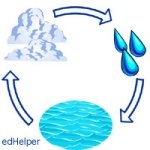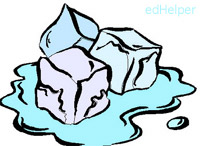
Worksheets and No Prep Teaching Resources
Reading Comprehension Worksheets
Water

Water
 Worksheets and No Prep Teaching Resources Reading Comprehension Worksheets Water |
 Water |
| edHelper's suggested reading level: | grades 3 to 4 | |
| Flesch-Kincaid grade level: | 6.31 |
|
Floating Cubes
By Trista L. Pollard |

|
 1 If ice is just frozen water, why does it float in liquid water? Well, water has many unique properties, especially when it is heated or cooled. Did you know that a cup of water has a different weight than a cup of ice (solid water) or a cup of water vapor (gaseous water)? Let's see what happens when water changes into its different forms (states).
1 If ice is just frozen water, why does it float in liquid water? Well, water has many unique properties, especially when it is heated or cooled. Did you know that a cup of water has a different weight than a cup of ice (solid water) or a cup of water vapor (gaseous water)? Let's see what happens when water changes into its different forms (states). |
Create Weekly Reading Books
Prepare for an entire week at once! |
| Leave your feedback on Floating Cubes (use this link if you found an error in the story) |
 |
Water
|
 |
Science
|